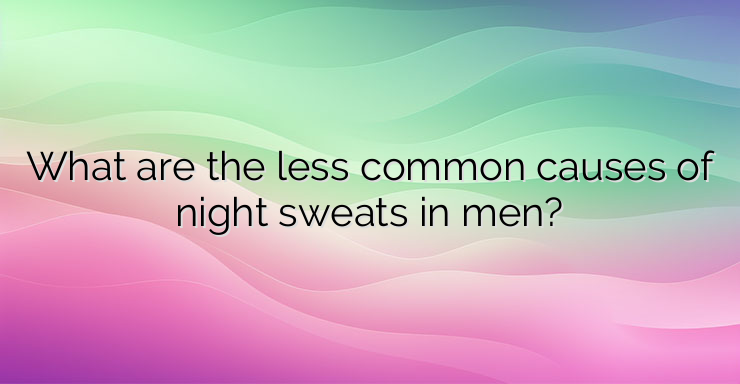Many medications can cause night sweats in men as a side effect. Some types of medications that have been linked to excessive sweating include: Selective serotonin reuptake inhibitors and tricyclic antidepressants; Steroids; Acetaminophen, aspirin, and other pain relievers; Antipsychotics; Medicines for diabetes; Medicines used in hormone therapy If a patient thinks night sweats are related to a medicine they have recently started taking, it is important to let the prescribing doctor know so an alternative medicine or method of coping can be recommended. night sweats. Some less common causes of night sweats in men include – low testosterone levels, other hormonal disorders and sleep apnea. Low Testosterone Levels Night sweats may be experienced with low testosterone levels. In men, the body produces less testosterone as we age, which is a natural process. But other factors, including – injury, medications, health conditions and substance abuse, can also reduce testosterone production. Other symptoms of low testosterone levels in men may include: Muscle weakness; Fatigue; Decreased libido; Erectile dysfunction; Decreased bone mass; Problems with focus and memory; Mood changes, including depression and irritability For this condition, treatment may include testosterone replacement therapy. other hormonal disorders Other hormonal disorders Hormonal disorders that can cause night sweats include: Hyperthyroidism; Carcinoid syndrome; Pheochromocytoma Along with night sweats, some common symptoms in these conditions include: Increased heart rate; Difficulty breathing or shortness of breath; Trembling; Diarrhea; Headache or abdominal pain; Sleep problems; Anxiety, nervousness, or other mood changes Sleep apnea Night sweats in men can sometimes be an indication of sleep apnea. In sleep apnea, breathing is interrupted while a person sleeps. This can happen many times during the night without the person being aware of the condition. Sleep apnea is more common in men and approximately 25% of men have the condition. It can develop when tissues in the throat block the airway (obstructive sleep apnea) or when a stroke or other medical problem affects the central nervous system’s ability to function properly (central sleep apnea). In addition to night sweats, sleep apnea can also cause: Snoring; Feeling very tired during the day; Frequent awakening at night; Waking up due to choking or suffocation; Sore throat; Concentration problems; Anxiety, depression or irritability Because sleep apnea can increase the risk of other health problems, consultation with a specialist is advisable. Bibliography: National Health Service. Night sweats Haider A, et al. Focal hyperhidrosis: Diagnosis and management Young P.Gastroesophageal reflux as a cause of night sweating


Leave a Reply